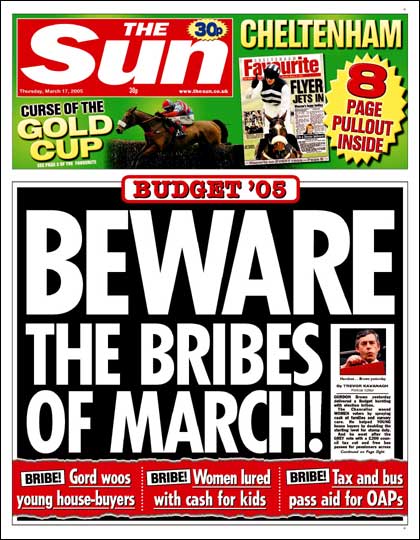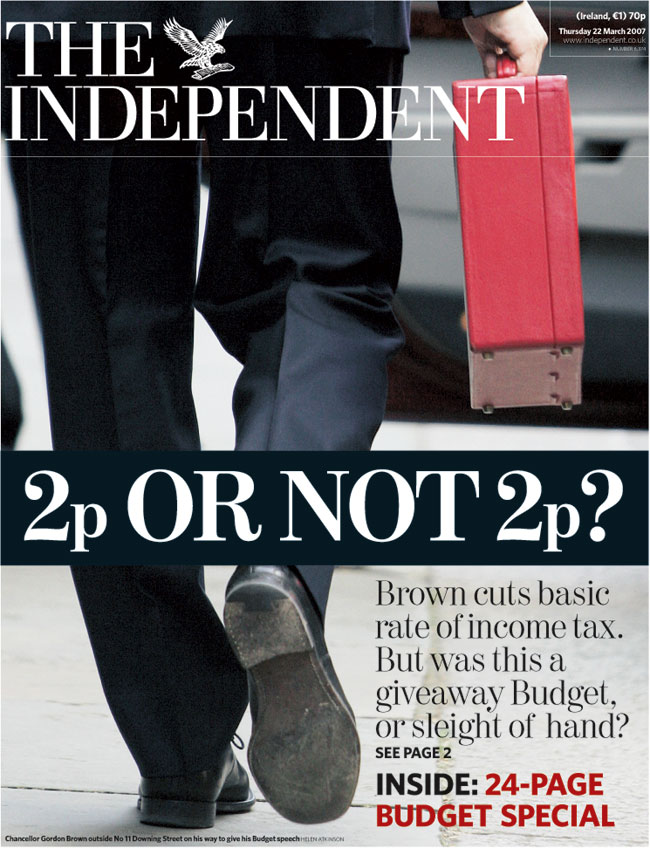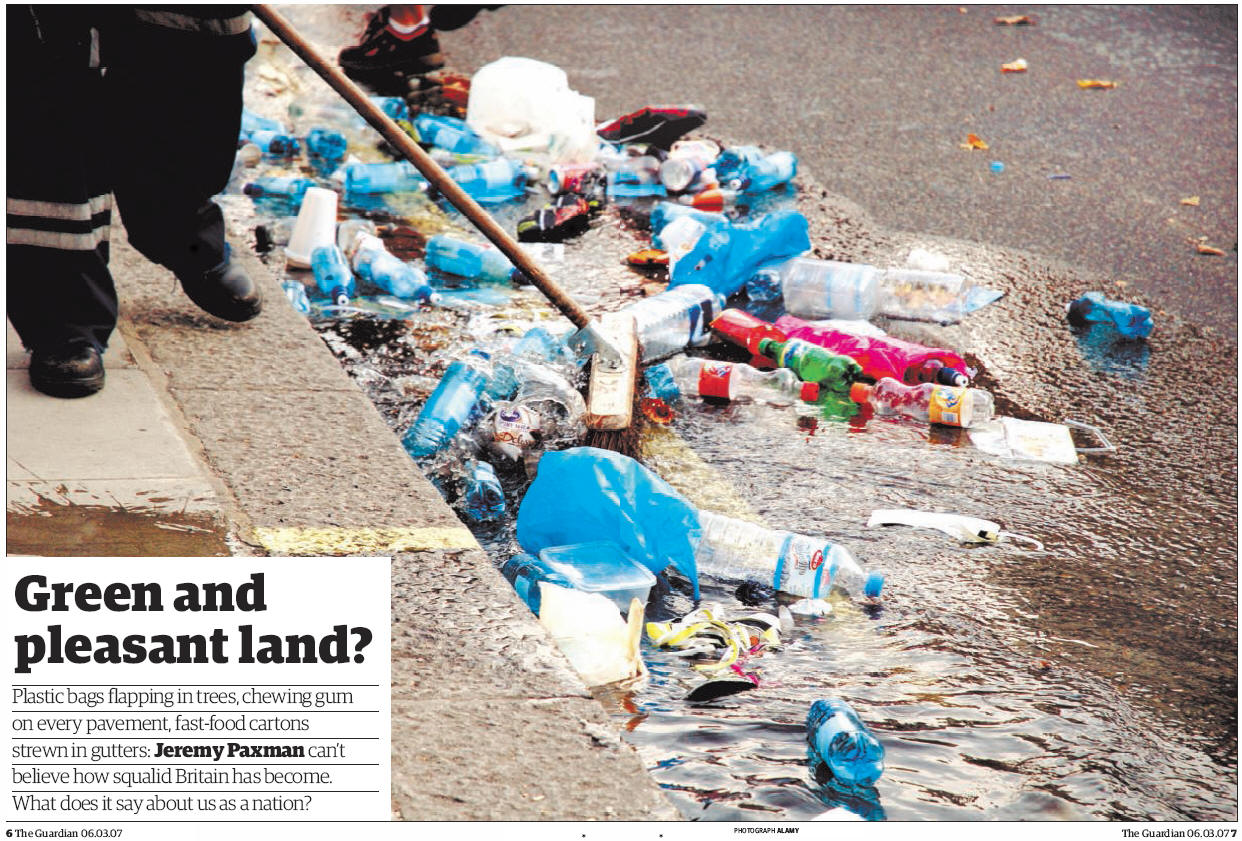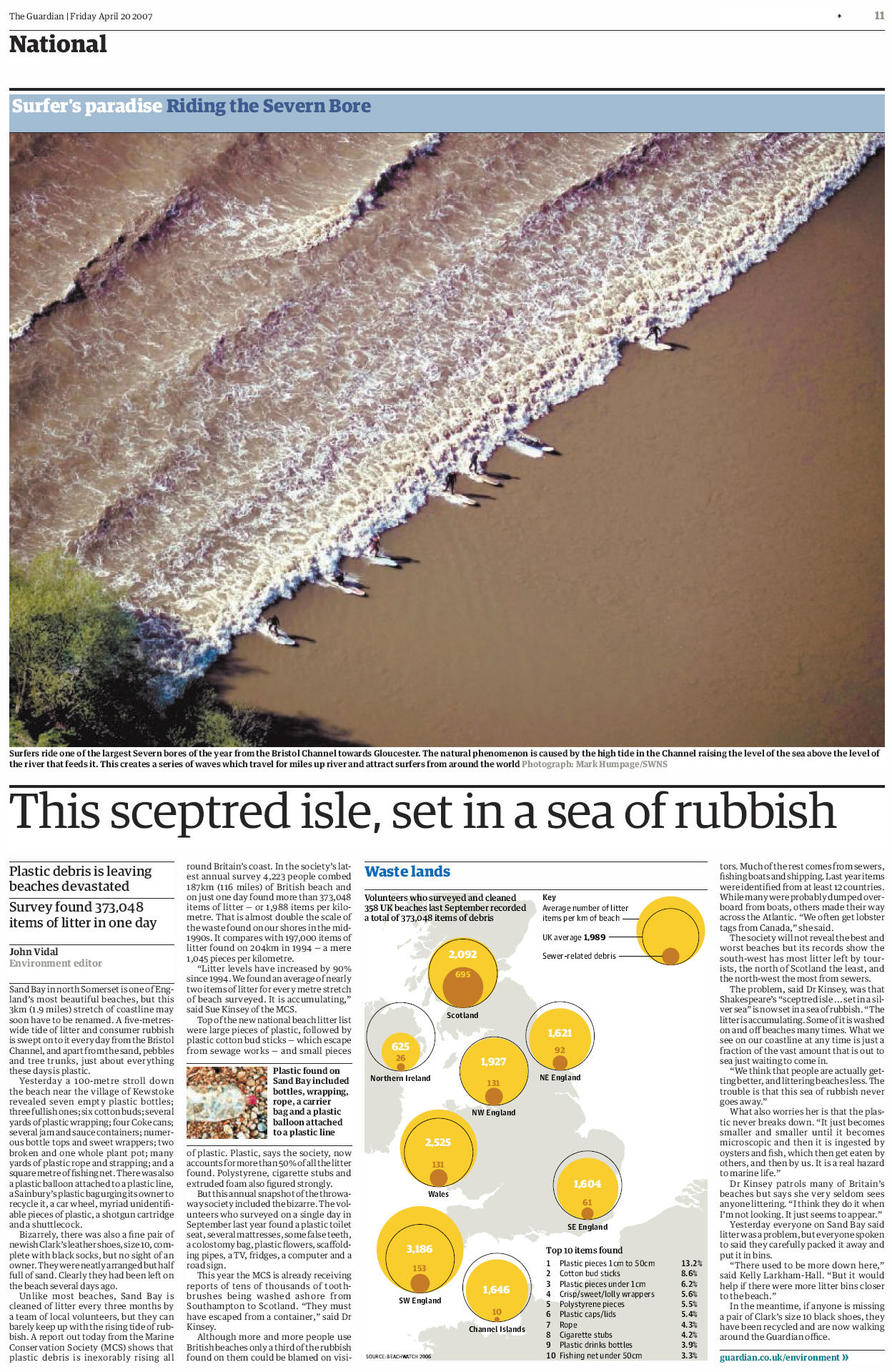|
Vocapedia >
Language > References, Puns >
Shakespeare

17 March 2005
http://www.thesun.co.uk/article/0,,2005082056,00.html


G2

Brown opens way for early election
with unexpected cut in
income tax
Published: 22 March 2007
The Independent
By Andrew Grice, Political Editor
Brown's final budget 2007 Gordon Brown announced tax cuts for Labour's
heartlands and Middle England as he gave himself the option of calling a general
election in the autumn of next year.
In his 11th and final Budget, the Chancellor unveiled a dramatic cut in the
basic rate of income tax from 22p to 20p in the pound, the lowest for 75 years.
But the Tories accused him of a "tax con" because his give-and-take package also
abolished the 10p in the pound bottom rate of tax, currently paid on the first
£2,150 of taxable income.
His surprise tax shake-up will take effect in April next year, providing a
possible platform for Mr Brown, who is expected to become Prime Minister this
summer, to call an election in the autumn of 2008 rather than wait until 2009.
Labour MPs welcomed his targeted tax cuts, saying they would boost the party's
election prospects.
Mr Brown also used his last Budget to draw the election battle lines between
himself and David Cameron on the environment and marriage. He increased road tax
for 4x4 vehicles and petrol duty but ridiculed Tory plans to tax frequent flyers
more. He also ruled out Tory proposals to reward marriage in the tax system,
saying his strategy would benefit six of the seven million families with
children.
A war of words broke out over the winners and losers from the tax changes.
Labour claimed four out of five households would be better or no worse off but
admitted that people without children would lose. It said a single-earner couple
with two children on median earnings of £27,000 a year would be £500 a year
better off, while the same family earning £35,900 would gain £320 a year. The
Tories claimed that people earning between £5,000 and £18,000 annually would be
hit by a tax rise because of the scrapping of the 10p rate. They said a single
person with no children earning £13,000 a year would pay £112 more in tax.
Although Labour said people on low incomes would be more than compensated by Mr
Brown's tax credits, the Tories predicted that almost one in four would miss out
because they would not claim the state benefit. They also claimed that
middle-income earners on about £40,000 a year would be hit by his decision to
align the national insurance and top tax rates.
George Osborne, the shadow Chancellor, said: "This is classic smoke and mirrors
from Gordon Brown. This is not a tax-cut Budget, it is a con-trick Budget. He is
giving with one hand and taking with the other."
The Tories, who were initially wrong-footed by the 2p tax cut, later denied that
Mr Brown had stolen their tax-cutting clothes. They claimed he could no longer
attack their plans to "share the proceeds of growth" between tax cuts and public
services because he was doing the same. However, Mr Cameron now faces a dilemma
over whether to match Labour's spending or hold out the prospect of further tax
cuts.
The independent Institute for Fiscal Studies said: "The changes to personal
taxes seem to have been carefully designed to ensure that this Budget is not a
tax raid on the rich: those earning over around £42,000 a year will find their
disposable income almost unaffected by the personal tax changes. However, almost
one in five families in the UK will lose, and, unusually for a Brown Budget, the
losers come from across the income distribution, and include some families with
children."
Taxes were cut by £2.5bn overall in a broadly neutral Budget with the money
raised through green taxes and reducing reliefs on empty property. Environmental
groups welcomed Mr Brown's green measures but said they did not go far enough.
"The Budget falls short of the measures required to tackle climate change," said
Tony Juniper, director of Friends of the Earth.
The tax changes overshadowed the announcement of a squeeze on public spending in
2008-11, when spending will rise by 2 per cent on top of inflation, half the
increase in recent years. Education will be the exception as the biggest winner
in a government-wide spending review expected this summer, enjoying average
rises of 5 per cent a year.
The Chancellor also used his swansong Budget to take 600,000 pensioners out of
the tax net through more generous allowances and promised that 200,000 more
children would be lifted out of poverty through an icrease in tax credits and
child benefit, which will rise from £17.45 a week for the first child to £20 by
2010. He also cut corporation tax from 30p to 28p in the pound.
Sir Menzies Campbell, the Liberal Democrat leader, said: "The 2p cut in the
basic rate is welcome, but let us be clear that this is an income tax cut for
the wealthy dressed up as a tax cut for the poor. The big increase in taxation
is a doubling of the starting rate of income tax [from 10p to 20p in the pound].
Anyone earning less than £15,000 will pay more in income tax."
2p or not 2p? That is the
question
Gordon Brown yesterday announced a 2p cut in the basic rate of income tax, to
take effect from April 2008. But will the cut result in a windfall for most
people?
The answer for the majority of families is no. The real winners should
eventually be families on low incomes - households with less than £25,000 coming
in each year. They will benefit from the lower basic rate of tax, as well as
increases in tax credits.
For everyone else, the 2p cut will be almost entirely wiped out by two other
measures: abolishing the 10 per cent starting rate of tax and the rise in the
maximum amount of salary on which the full 11 per cent rate of national
insurance is payable.
Brown opens way for early election
with unexpected cut in income tax,
I, 22.3.2007,
http://news.independent.co.uk/uk/politics/article2381133.ece
Related > Anglonautes >
Vocapedia
describing
language, actions, things, facts, events, trends, ideas,
sounds, pictures, places,
people, personality traits, behaviour
drama, theatre > Shakespeare
(1564-1616)
|